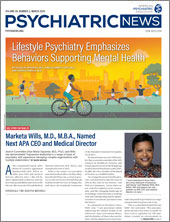Psychiatrist Pamela Collins, M.D., M.P.H., a leader in global health and mental health, will deliver the Chester M. Pierce Human Rights Award Lecture at this year’s Annual Meeting. She is chair of the APA Council on Global Psychiatry and Health and Bloomberg Centennial Professor and Chair of the Department of Mental Health at the Johns Hopkins Bloomberg School of Public Health.
“The depth and breadth of Dr. Collins’ achievements in global health is astonishing,” said APA President Petros Levounis, M.D., M.A. “Her international work has encompassed HIV/AIDS prevention and treatment programs, suicide prevention, rural mental health, women’s health and mental health, and outreach strategies for hard-to-reach populations. A mentee and protégé of Chester M. Pierce, M.D., she has carried forward his passion for social justice and for extending psychiatric expertise globally. We are fortunate to have her deliver the 2024 Chester M. Pierce Human Rights Award Lecture.”
Prior to her appointment as chair of mental health at the Bloomberg School of Public Health—the only school of public health in the country with a dedicated department of mental health—Collins was director of the University of Washington Consortium for Global Mental Health and executive director of the UW International Training and Education Center for Health. In those capacities she collaborated with the World Health Organization (WHO) on the implementation of the “
WHO Special Initiative for Mental Health” and, as a collaborator with the
African Cohort Study, led a research group identifying mental health and behavioral correlates of HIV.
From 2009 to 2017 Collins was director of the National Institute of Mental Health Office for Research on Disparities and Global Mental Health and director of the Office of Rural Mental Health. Among dozens of achievements in those roles, Collins led the
Grand Challenges in Global Mental Health study, engaging more than 400 participants from 60 countries to identify priorities for global mental health research. She also developed the
RISING SUN initiative to reduce suicide in Indigenous Arctic communities.
The title of her lecture at the meeting is “Discrimination, Displacement and Erasure: How Global and Local Structures of Power Shape Opportunities and Mental Health Outcomes.”
In a letter to the APA Nominating Committee, Annelle Primm, M.D., M.P.H., an associate professor of psychiatry and behavioral sciences at Johns Hopkins University School of Medicine, hailed Collins as “an ideal choice” for the award. Primm is also former APA senior deputy medical director and director of the APA Office of Minority and National Affairs (now the Division of Diversity and Health Equity).
She noted as well that Collins, as a mentee of Pierce, shared his vision for understanding how racism affects mental health and for global outreach of psychiatry. “As a contributor to the APA Publishing book, Mental Health, Racism and Contemporary Challenges of Being Black in America, Dr. Collins and her co-author chronicled how Dr. Pierce’s work influenced how we think about social stressors that are associated with racism and sexism as well as their impact on Black individuals across America and globally.”
The Chester M. Pierce Human Rights Award recognizes the extraordinary efforts of individuals to promote the human rights of populations with mental health needs by bringing attention to their work. Originally established in 1990 to raise awareness of human rights abuses, the award was renamed in 2017 to honor Chester M. Pierce, M.D. (1927-2016) in recognition of his dedication as an innovative researcher on humans in extreme environments; an advocate against disparities, stigma, and discrimination; and a pioneer and visionary in global mental health.
“This year’s lecture promises to be informative and enlightening,” said APA CEO and Medical Director Saul Levin, M.D., M.P.A. “I urge everyone to attend Dr. Collins’ lecture.” ■
The Chester M. Pierce Human Rights Award Lecture will be presented on Sunday, May 5, from 3:45 p.m. to 5:15 p.m. in the Javits Center.

